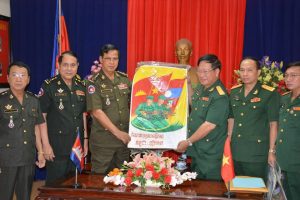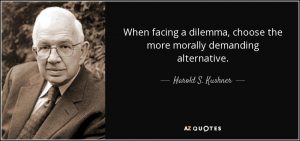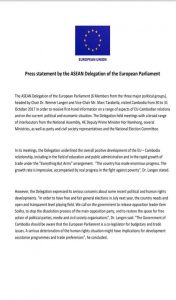Leadership
now browsing by category
Political turmoil may threaten Cambodia’s hard-won economic achievements
Thank you very much Mr. Weijia for your well-balanced argument between modern political economy and pure win-win one man show strategy of Prime Minister Hun Sen. As said, China has claimed her achievements are through China’s model of political economy, corruption-free state-of-the-arts, and global-oriented approach leadership of President Xi. All these are non-existence in Cambodia PM leadership, which shall pose great risk for China in its global role achievement as articulated by President Xi if China has privately or publicly backed the current moves of Cambodia government.
Op-Ed: Global Times
Political turmoil may threaten Cambodia’s hard-won economic achievements

Arts Exchange Program between VN, Cambodia and Lao on theme of Military Cooperation. (Photo Courtesy monoroom.com dated October 25, 2017 or http://hrkhnews.com/?p=7419)
A close watch needs to be kept on the tense political situation in Cambodia, which is a popular destination for Chinese investors. The Southeast Asian country has experienced strong economic growth in recent years, but its success may be threatened by possible political turmoil.On Friday, the IMF gave a positive appraisal of Cambodia’s economy, saying it is expected to grow by 6.9 percent this year. Having graduated from a low-income to a lower middle-income country, Cambodia seems confident in transforming itself into an upper middle-income economy by 2030 and a high-income country by 2050. Domestic and foreign observers alike have optimistic views of the nation’s economy.
However, rapid economic growth tells only part of the story; the other part is domestic political uncertainty.
According to the Financial Times, Cambodian Prime Minister Hun Sen warned earlier this year that his country could descend into civil war. Over the past few weeks, tension escalated after Sam Rainsy, the former president of Cambodia’s opposition, was arrested and charged with treason for allegedly conspiring with a foreign power to overthrow the Hun Sen administration.
Political stability is a necessity for a nation to prosper and develop, especially a country like Cambodia, whose economy has traditionally been supported by tourism and garment exports.
Letting the situation in Cambodian deteriorate would scare off foreign tourists and investors and deal a heavy blow to the local economy.
Last week, the US renewed a call for the Hun Sen administration to release the country’s opposition leaders.
Cambodia-US relations are strained, and the possibility of US sanctions against garment imports from Cambodia cannot be ruled out. Criticism from Western countries may cast shadows over Cambodia’s economic future.
Appropriate solutions are needed to avoid a further escalation of tension and even conflict. Economic growth in recent years was a hard-won achievement for Cambodia and the growth trend should not be interrupted by the country’s rising political tension. People should become more aware of the importance of political stability to protect the results of economic development.
As an important economic partner of Cambodia, China will pay close attention to the situation in the Southeast Asian country and willingly provide the necessary help.
The author is a reporter with the Global Times. bizopinion@globaltimes.com.cn














